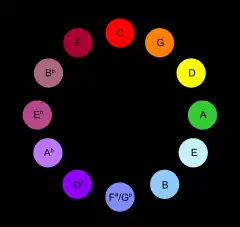Audiovisual art
Audiovisual art is the exploration of kinetic abstract art and music or sound set in relation to each other. It includes visual music, abstract film, audiovisual performances and installations.
Overview
The book Art and the Senses cites the Italian Futurist artists, Fortunato Depero and Luigi Russolo as designing art machines in 1915 to create a multisensory experience of sound, movement and colour.[1] In the 1970s Harry Bertoia created sound sculptures of objects to have a multisensory effect, exploring the relationships between the sound, the initiating event and the material properties of the objects.[1] In an example with overt musical connections, The Oxford Handbook of New Audiovisual Aesthetics cites musician Brian Williams (aka Lustmord) as someone whose practise crosses audiovisual art and mainstream media, where his work is "not traditionally 'musical'" and has "clearly visual aspects".[2]
See also
References
- Bacci, Francesca; Melcher, David (2011), Art and the Senses, Oxford University Press, pp. 286–7, ISBN 978-0-19-923060-0
- Richardson, John; Gorbman, Claudia; Vernallis, Carol (2013), The Oxford Handbook of New Audiovisual Aesthetics, Oxford University Press, pp. 367–8, ISBN 978-0-19-973386-6
Further reading
- John Whitney (1980). Digital Harmony - On the Complementarity of Music and Visual Art. Byte Books. ISBN 9780070700154.
- Adriano Abbado, "Perceptual Correspondences of Abstract Animation and Synthetic Sound", Leonardo, Volume 21, Issue 5, MIT Press, 1988
- Andy Hunt, Ross Kirk, Richard Orton, Benji Merrison, "A generic model for compositional approaches to audiovisual media", Cambridge Journals, 1998
- Rodrigo F. Cádiz, "Fuzzy logic in the arts: applications in audiovisual composition and sound synthesis", NAFIPS, 2005
- Michael Faulkner/D-FUSE, "vj audio-visual art + vj culture", Laurence King Publishing Ltd, 2006
- Mick Grierson, "Audiovisual composition", into the pill, 2007
- Holly Rogers, Sounding the Gallery: Video and the Rise of Art Music (New York: Oxford University Press, 2013).
